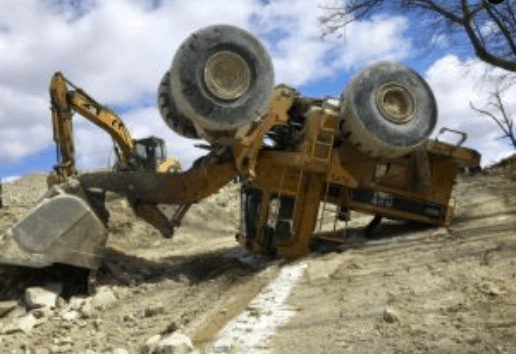What does a bad day look like? Close call: putting yourself on the right side of survival

While building an embankment to circumvent any material from a water supply, a front end loader operator experienced a close call.
On March 13, 2018, an extremely close call was taking place. The operator backed his front end loader over the top of a roadway berm; the loader and operator slipped down the embankment; and the loader landed turning over onto its roof. Fortunately, the operator was wearing his seat belt. He unfastened the seat belt and escaped the upside-down machine through the broken right-side window of the loader door.
Front end loaders are often involved in a close call or an accident due to a shift in the machine’s center of gravity.
See another close call here.
The U.S. Department of Labor Mine Safety and Health Administration (MSHA) documented this incident and issued the statement and best practices below for operating front end loaders.
The size and weight of front end loaders, combined with the limited visibility from the cab, makes the job of backing a front end loader potentially hazardous. To prevent a mishap when operating a front end loader:
• Load the bucket evenly and avoid overloading (refer to the load limits in the operating manual). Keep the bucket low when operating on hills.
• Construct berms or other restraints of adequate height and strength to prevent overtravel and warn operators of hazardous areas.
• Ensure that objects inside of the cab are secured so they don’t become airborne during an accident.
• ALWAYS wear your seatbelt.
• Maintain control of mobile equipment by traveling safe speeds and not
overloading equipment.
We would add the following best practices for loaders:
• Check the manufacturer’s recommendations and supplement appropriate wheel ballast or counterweight.
• Employ maximum stabilizing factors, such as moving the wheels to the widest setting.
• Ensure everyone within range of the loader location is a safe distance away.
• Operate the loader with its load as close to the ground as possible. Should the rear of the tractor tip, its bucket will hit the ground before the tractor tips.
Use the TapRooT® System to put safety first and to solve problems.
Attend a TapRooT® course. We offer a basic 2-day course and an advanced 5-day course. You may also contact us about having a course at your site.



